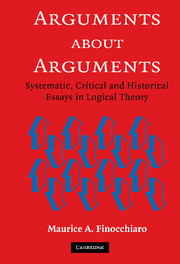Book contents
- Frontmatter
- Contents
- Preface and Acknowledgments
- Introduction : An Approach to a Branch of Logic
- Theorizing about reasoning and argument
- Fallacies and asymmetries
- 6 Fallacies and the Evaluation of Reasoning (1981)
- 7 Six Types of Fallaciousness : Toward a Realistic Theory of Logical Criticism (1987)
- 8 Asymmetries in Argumentation and Evaluation (1992)
- 9 The Positive versus the Negative Evaluation of Arguments (1994)
- Critiques
- Historical analyses
- Selected Bibliography
- Index
9 - The Positive versus the Negative Evaluation of Arguments (1994)
from Fallacies and asymmetries
Published online by Cambridge University Press: 05 February 2015
- Frontmatter
- Contents
- Preface and Acknowledgments
- Introduction : An Approach to a Branch of Logic
- Theorizing about reasoning and argument
- Fallacies and asymmetries
- 6 Fallacies and the Evaluation of Reasoning (1981)
- 7 Six Types of Fallaciousness : Toward a Realistic Theory of Logical Criticism (1987)
- 8 Asymmetries in Argumentation and Evaluation (1992)
- 9 The Positive versus the Negative Evaluation of Arguments (1994)
- Critiques
- Historical analyses
- Selected Bibliography
- Index
Summary
Introduction
The problem I should like to explore is the question of whether there are significant differences between the positive and the negative evaluation of arguments, what is the nature and origin of these differences, and what are their implications for theory, practice, and teaching. Because this is a relatively novel problem, most of my discussion will have to be concerned with a formulation and clarification of the issues. Nevertheless, I hope to be able to focus on a few details, and perhaps suggest some fruitful lines of inquiry for the resolution of some of these issues.
Preliminary Conceptual Clarifications
Evaluation is here something I would distinguish from the construction and the interpretation arguments, without however separating these three activities. In other words, the construction, the interpretation, and the evaluation of arguments are interrelated, but that is not to say that they are the same. In short, the distinction is meant to avoid confusion and conflation, not to establish a separation or bifurcation. At the terminological level, I think it would be proper to refer to what I have in mind by means of other labels such as appraisal, assessment, and judgment. I am reluctant to add the term “criticism” to this list of near-synonyms because I think criticism tends to have a negative connotation, in the sense of negative evaluation; nevertheless, to the extent that this connotation can be avoided, I would have no objection to speaking also of criticism.
- Type
- Chapter
- Information
- Arguments about ArgumentsSystematic, Critical, and Historical Essays In Logical Theory, pp. 159 - 178Publisher: Cambridge University PressPrint publication year: 2005



